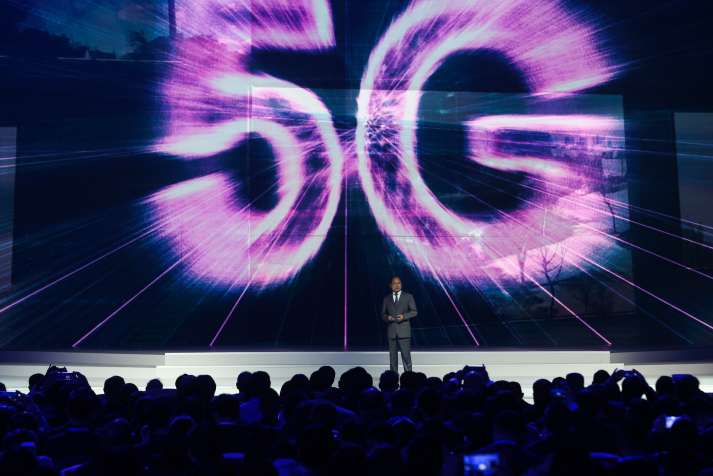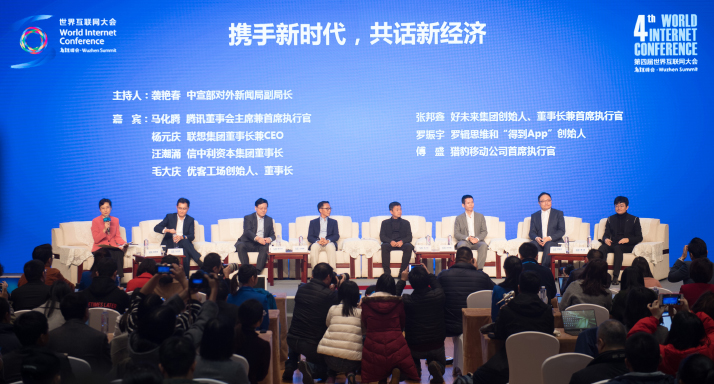|
||||||
|
||||||
| Home Nation World Business Opinion Lifestyle ChinAfrica Multimedia Columnists Documents Special Reports |
|
||||||
|
||||||
| Home Nation World Business Opinion Lifestyle ChinAfrica Multimedia Columnists Documents Special Reports |
| Nation |
| The Smart Exhibition |
| The Fourth World Internet Conference offers the world a glimpse of mankind's digital future |
| By Lu Yan | NO. 50 DECEMBER 14, 2017 |
 Attendees try out a smart home system at an Internet expo on the sidelines of the World Internet Conference, December 2 (XINHUA)
"I've been under the weather recently." "Where does it hurt? " "Could you be more specific?" "When did it start?"This seemingly conventional conversation between a patient and a doctor appears normal enough, but all is not as meets the eye. The exchange in fact took place between a patient and a robot named Wangzai at the exhibition center hosting the Fourth World Internet Conference (WIC) in Wuzhen, east China's Zhejiang Province. Wangzai, whose technical name is Sogou01, has been developed as part of a collaboration between Sogou Inc., one of China's leading Internet product and service providers, and the Tiangong Institute for Intelligent Computing of Tsinghua, a department at one of the country's top academic institutions, with the help of experts from robotics laboratories around the world. Utilizing the latest in artificial intelligence (AI) technology, the dog-faced robot can see, think, and answer questions thanks to the complex operations made possible by its programing. And giving medical advice is only one of its many amazing stunts. The Fourth WIC, held on December 3-5, proved to be a major coming together of new products, especially the latest in Internet technology like Wangzai. Over 1,500 guests descended on Wuzhen for the conference, hailing from more than 80 countries, including heads of state and industry celebrities such as Apple boss Tim Cook and Google CEO Sundar Pichai. Homegrown Chinese companies and foreign giants alike participated in the activities, with representatives from Alibaba, Baidu and Tencent collaborating with those of Cisco, Microsoft and Facebook to conduct the opening and closing ceremonies. They also attended forums where among the many topics discussed were those relating to the digital economy, cutting-edge technology, and cyberspace governance. "Building a cyberspace community with a shared future has become the unanimous goal of our international society," Chinese President Xi Jinping said in a congratulatory letter to the conference.  Xu Zhijun, Huawei CEO, introduces the merits of 5G technology during the release ceremony for world-leading Internet, scientific and technological achievements in Wuzhen, east China's Zhejiang Province, on December 3 (XINHUA)
At the cutting-edge A major source of interest at this year's WIC was so-called "black technology," a term popular amongst Chinese Internet users for technology seemingly beyond the capacity of human innovation. The application of such lexicon here, usually reserved for the realm of sci-fi or fantasy, is itself an indication of the futuristic place the tech industry finds itself in 2017. One company exhibited a drone able to automatically transport a single passenger up to 60 mph, whilst elsewhere Face++ demonstrated the speed and accuracy of their facial recognition technology to general astonishment. To mark this year's event, a committee composed of 44 experts from around the world selected 18 articles of world-leading technological achievement from a pool of nearly 1,000 candidates, covering theoretical innovations, techniques, products and business models, their announcement constituting one of the headline events at the conference."Technology should be not only the product of a lab, but able to be applied to all aspects of people's daily life, so as to promote social progress and improve livelihoods." These were the words of Zhang Yong, Director and Chief Executive Officer of the Alibaba Group, at the release ceremony on December 3. Zhang demonstrated how the ET Brain, one of the shortlisted achievements, can reach this goal. By automatically altering traffic lights, the ET Brain was able to half the time it took for an ambulance to reach an accident site, saving vast amounts of valuable time for treating the injured. This is one of only many functions that Alibaba claims can make people's lives better. According to the company's official introduction, the ET Medical Brain is a suite of AI solutions designed to ease the workload of medical personnel by assuming the role of a patient's virtual assistant. The system is also capable of conducting medical imaging, drug development and hospital management, freeing hospital workers from mundane, repetitive tasks and allowing them to focus on providing high quality care for their patients. Another Alibaba creation, the ET Industrial Brain, is capable of such feats as preventing large-scale mechanical failures, monitoring production processes, and optimizing energy consumption. Another highlight of the ceremony was the BeiDou Navigation Satellite System (BDS). Independently constructed and operated by Chinese developers, BDS provides real time, all weather, accurate navigation services to global users. According to Ran Chengqi, Director of China's Satellite Navigation System Management Office and spokesperson for the system, BDS is something of a "guardian angel" for fishermen, having saved the lives of more than 10,000 fishermen since 2003. BDS has also emerged as a crucial component of the Internet of vehicles. As of this year, 4.8 million transport vehicles were installed with the system, reducing the rate of major accidents by almost 50 percent, whilst cutting travel times by more than 30 percent. In addition to these, the creations of Baidu, Huawei, Tesla, Apple, Amazon and several other world famous enterprises featured during the release ceremony, with visitors given the chance to interact with various technological innovations throughout the event in the form of cash-free payment, lip-reading recognition and even a customized shoe designer.  Entrepreneurs take questions from reporters at the World Internet Conference on December 4 (XINHUA)
Common concerns Besides providing a stage for more than 400 technology companies to advertise their high-end products, the WIC also served as a platform for business leaders to share their perspectives on the development and future of a rapidly changing industry. The topic of AI generated the most discussion. China's top company executives reached a consensus on the future role that AI will play in China's economic reform as the technology reshapes various sectors such as retail, manufacturing and healthcare. "Although the days of demographic dividends are gone, AI may be a new driver for growth," said Robin Li, CEO of Baidu Inc., China's largest search engine provider, adding that AI will exert a far bigger influence on how businesses are run. In his keynote speech Apple CEO Tim Cook also shared his views on the relationship between artificial and human intelligences, joking that "much has been said about the potential negative aspects of AI, but I do not care about machines that think like humans; I'm worried about humans thinking like cars." However, at the heart of his address was a grave, existential warning for the future of mankind; that whilst technology continues to saturate the human world, we must be sure to infuse technology with humanity and with human values. Google CEO Sundar Pichai echoed these sentiments, stating that whilst in the past men adapted themselves to computers, in the future it would be the other way around. AI, however, was not the only item on the agenda, and discussions covered a breadth of other topics covering the sharing economy, Internet targeted poverty reduction, and the protection of juveniles online. An era of cooperation As the world has undergone profound transformation in the digital era, so the Internet has been integrated into the political, military, economic, cultural and social systems which affect our lives. In his congratulatory letter, President Xi pointed out that the development of the Internet has posed many new challenges for sovereignty, security, and development around the world, and expressed his hope that China can work alongside the international community to respect cyberspace sovereignty. This year's WIC witnessed the release of the China Internet Development Report 2017 and the World Internet Development Report 2017, documents compiled by Chinese ministries, government departments, academic institutions, and research centers to monitor the current trends in Internet development within China and across the world. According to the reports, as of June 2017 there were 3.89 billion Internet users worldwide, of which 751 million were in China, more than any other country. Yang Shuzhen, President of Chinese Academy of Cyberspace, the institution responsible for production of the report, asserted his belief that cyberspace development had already become a new field of international cooperation, with governments, international organizations, Internet companies and individuals now actively involved in the development of international rules for cyberspace, with initial results looking positive. The remarks of Alibaba Group Chairman Jack Ma at the WIC succinctly outlined the direction in which we are moving. "Over the next 30 years, the Internet will no longer be the Internet of Internet companies; it will be the Internet of all people. It will be everywhere, and no one will live without it," he said. International cooperation will be necessary for establishing any future cyberspace community, and according to Ma, it is impossible for one country, or one company, to solve all the world's problems. "We need to work together to build a shared future, embrace technology and share innovations and achievements. Only in this way, can human society develop sustainably," he said. Apple's Tim Cook struck a similar tone as he announced "we are proud to have worked alongside many of our partners in China to help build a community that will join a common future in cyberspace." With such overwhelming consensus within the industry, the future looks both bright and digital.
Copyedited by Laurence Coulton Comments to luyan@bjreview.com |
About Us | Contact Us | Advertise with Us | Subscribe
|
||
| Copyright Beijing Review All rights reserved 京ICP备08005356号 京公网安备110102005860号 |